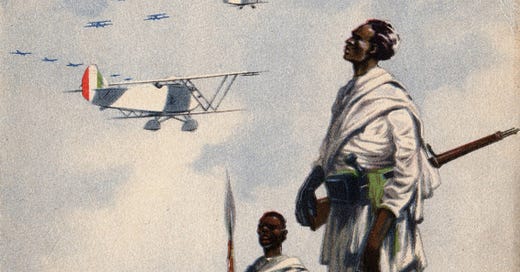Wars often seem to begin with a thunderclap. The Minutemen of Concord and Lexington, warned by the fevered midnight ride of one Paul Revere, plunged into the Revolution against the British as the sun rose on a spring morning in April of 1775. In the dark stillness in the wee hours of an April day some 85 years later Rebel cannons opened fire on Fort Sumter, igniting the American Civil War. On a December morning in December of 1941 (shooting wars always begin at dawn), an unlooked-for Japanese air fleet thrust a brand into the American tinder box. And 9/11 goes without saying.
Of course, the suddenness is largely a question of perspective. The sun does not permit the observation of the stars during the day, and similarly the tide of provocations that led to each of these cataclysms tend to blend into the blue—or gray, as it were—skies of history. Most semi-sentient Americans have at least some fuzzy notion of the Stamp Act and the Boston Massacre. Bloody Kansas and the Compromise of 1850 are at least well-known enough to merit inclusion in the occasional trivia game. The American embargo of Japan in July 1941 isn’t quite the high-school history textbook fodder these other events were, but there is at least a vague understanding that World War II didn’t begin with Pearl Harbor.
How many people anywhere are aware of Abyssinia, a tiny pebble that predicated a landslide that buried seventy million people, leveled cities, and completely overturned the world order? Not many, I would bet.
I’m playing a bit of a game here in that nobody calls Ethiopia Abyssinia any longer. I’m not sure why the exonym was dropped—possibly due to a broad agreement that exonyms generally are demeaning, though practically every country on earth has a different name for Germany and nobody seems to mind, so perhaps it was something else. But what is certain is that when Italy sent a couple hundred thousand soldiers across the Eritrean border in the fall of 1935, nobody much gave a rip except insofar as they could gain some advantage from the matter.
The jumbling of alliances during the Italo-Ethiopian War (technically the Second Italo-Ethiopian if you’re scoring at home) is an interesting historical curiosity. Germany, which in its early Third Reich days was more Larry to Italy’s fascist Moe than the other way round, actually supplied Ethiopia with weapons and ammunition, on the grounds that it resented Italy’s opposition to Germany’s proposed Anschluss (annexation) of Austria. The idea was that an Italy mired in war would grow more economically dependent on Germany and would thus be more malleable.
Japan, which in the above formulation would have been either Curly or Shemp depending on your personal predilections, swore neutrality to the Italians, but this was upsetting the Japanese people, who sympathized with the Ethiopians as a nonwhite empire like themselves. Many Japanese raised money for Ethiopia, though official support was not forthcoming.
These countries would all be aggressors within a few short years (Japan was already snatching chunks of China), so their moral failures in 1935 are pretty much beside the point. Britain and France, on the other hand, could have done better. France simply washed its hands of the Horn of Africa in exchange for Italy’s support against Germany, which the eagle-eyed among you will note they did not receive. The British were similarly unconcerned with the fate of the small East African nation, amending its alliance with France and Italy in the Stresa Front agreement in April to restrict its effects to Europe only, which Italy took as acceptance of its planned invasion.
In July the United Kingdom established an arms embargo on both countries, which was a ridiculous gesture—given that a good portion of the Ethiopian troops were armed with bows and arrows, this ham-handed attempt at equity amounted to a gift to Italy. This sort of equivocation was practically de rigeur—The League of Nations, which had been established specifically to curb aggressive behavior, did basically nothing as Ethiopia repeatedly asked for neutral observers over the course of 1935.
On October 3 Italy commenced their invasion, to which the League responded with a another fig leaf—limited economic sanctions on Italy. These crucially left out the key resources of oil and steel, and were completely porous anyway since not all members of the league participated. Does any of this sound familiar?
Finally, in December the United Kingdom and France made a secret proposal to Italy which would have granted huge chunks of Ethiopian territory in exchange for a cessation of violence. Italy, emboldened by the obvious weakness of the League, simply extemporized until the agreement became public, to the consternation of the British public, whose condemnation rendered it moot. It would not be the last time, however, that the U.K. and France would sell out a less powerful country in pursuit of what they vainly considered peace, as Czechoslovakia would discover in 1938.
And what did all of this prevarication and moral spinelessness produce? In March of 1936 Germany marched 20,000 troops into the Rhineland, the buffer along the western German border with France which had been demilitarized by the Versailles Treaty at the end of the First World War. Was this a response to the weakness shown by the League? It’s debatable, but the timeline is compelling, and the remilitarization of the Rhineland was only the first of several opportunities to check aggression by the future Axis nations.
But nobody rose to any of these occasions, and we all know what happened afterward.
The parallels to Western actions vis-a-vis Ukraine are frightening. One should be leery, of course, of assuming that historical analogies are predictors of the future, but the principle that aggression should not be rewarded stands independent of any putative downstream results of doing so—right of conquest is orthogonal to the democratic values we supposedly hold dear. So there’s no particularly good reason to put the matter to a test a second time, and if the United States and Germany have been slow to reach that conclusion, Britain and particularly France do seem to have come around. Countries bordering Russia certainly have—Estonia in particular has been very proactive with their assistance to Ukraine, as well as their own preparations for a war. As well they should—if Ukraine is the Abyssinia in this analogy, Estonia is potentially Poland. So is Poland for that matter, which is why Poland is frantically building defenses along their eastern frontier.
There is a lot of talk that pushing back too hard could lead to World War III, the implication being that it would necessarily be a nuclear holocaust. I would suggest that that a festering wound is more likely to result in sepsis—allowing the war to drag out the way we’ve been doing is a far greater danger. Every day the fighting continues is another chance that something unexpected and unsavory will occur.
I really strive to avoid making predictions in this (or any) conflict, but I have a strong sense that there will be NATO troops in Ukraine this year; the Estonians have been chafing to provide in-country logistics support in order to free up Ukrainian soldiers for the front lines. I wouldn’t be at all surprised to see French and possibly British air defense operating in eastern Poland or even in western Ukraine, similar to what the U.S. and Britain did in the eastern Mediterranean and the Red Sea in assisting Israel against Iran’s massive drone strike in early April. These actions of course will be decried by Russia as escalation, but there are two facts to be reckoned with: First, Russia will continue to grind away at Ukraine until it succumbs, and second, the only way to force them to stop is to force them to stop. This is not without risk, but if we continue to grant Ukraine just enough support to keep them from losing, we may well find ourselves one day forgetting the opening act of another war to end all wars.
The title of this piece is taken from a maxim of Socrates, that justice is the virtue of the soul—formulated as a response to Thrasymachus’ assertion that justice is merely the the preference of power. I think my opinions about this particular war might be interpreted as stemming from notions of realpolitik, but in this matter Socrates was clearly the idealist, and while I don’t believe that idealism can stop wars, I do believe that the pursuit of justice is a moral imperative.





I love how you threw in The Three Stooges joke.
Thanks for your thoughtful perspective.